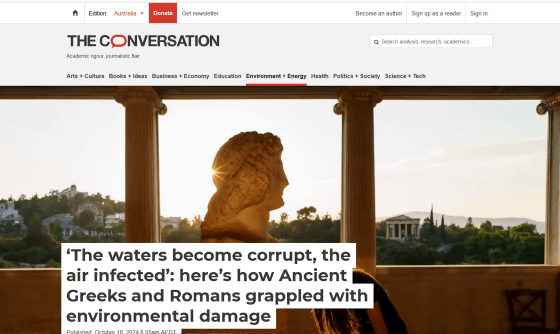The ancient Romans also knew that environmental pollution caused by humans could ultimately harm their health.

Environmental pollution has become a major problem for modern society, but the people of
'The waters become corrupt, the air infected': here's how Ancient Greeks and Romans grappled with environmental damage
https://theconversation.com/the-waters-become-corrupt-the-air-infected-heres-how-ancient-greeks-and-romans-grappled-with-environmental-damage-236680

Gaius Plinius Secundus (Pliny the Elder) , a politician and naturalist from the 1st century AD, wrote in his book ' Natural History ,' which describes a wide range of knowledge including geography, astronomy, flora, fauna, and minerals, that 'we pollute rivers and other natural elements, and turn the very air, which is the main support of life, into a medium that destroys it,' and 'it is my first and most joyous duty to support the Earth, the parent of all things, and to defend her interests.' In other words, it was recognized that humans were polluting nature at that time, and even the importance of protecting nature was advocated.
Pliny the Elder's words still apply today, nearly 2,000 years later. Environmental concerns have become a hot political topic in modern society, and in a 2023 survey of approximately 20,000 young Australians, 44% of young people cited environmental issues as the most important issue.

Ancient Roman writers also recorded that soldiers polluted the water and air around their camps. In
There is also much talk about the pollution of the Tiber River , which flows through Rome. The 1st-2nd century AD historian Gaius Suetonius Tranquillus wrote that before the Roman Emperor Augustus , who reigned from 27 BC to 17 AD, implemented a policy of purification, the Tiber was 'full of rubbish and narrowed by overhanging buildings.'
The 1st-2nd century AD Roman poet Decimus Junius Juvenal described the Tiber as a 'gushing sewer,' and the 2nd-3rd century AD physician Galen also claimed the river was so polluted that fish caught there were unsafe to eat.

The ancient Greeks and Romans also undertook various measures to prevent or reduce environmental harm. For example, in 420 BC, the Athenians introduced laws to protect
There were also laws restricting public excrement and waste disposal, and some rulers began building sewers and aqueducts to prevent pollution. The Roman Emperor Nerva , who reigned from 96 to 98 AD, is said to have implemented policies to make Rome a cleaner and healthier city, and Sextus Julius Frontinus, the custodian of Rome's aqueducts, said, 'The appearance of the city is cleaner, the air is clearer, and the causes of unwholesome air, which once gave the city an ugly impression, are now removed.'
The idea that environmental pollution was a cause of health problems was around that time. The 1st-2nd century AD statesman Gaius Plinius Caecilius Secundus (Pliny the Younger) wrote a letter to the Roman Emperor Trajan complaining about the problems of a stream flowing through the city of Amastris (now Amasura ) in Turkey.
In a letter to Trajan, Pliny the Younger claimed that the stream was being used as a sewer, releasing a noxious stench that was damaging the appearance of the city and the health of the people, to which Trajan replied , 'My dear Pliny, if the stream that flows through the city of Amastris, if left uncovered, is a sufficient reason to cover it.'

These stories show that the ancient Romans understood that environmental issues - land, air, rivers - were intertwined with human health. 'As humanity grapples with multiple environmental crises, it's worth revisiting this ancient knowledge. In short, keeping the planet healthy is good for the environment as well as for us,' Panegires said.
Related Posts:
in Note, Posted by log1h_ik







